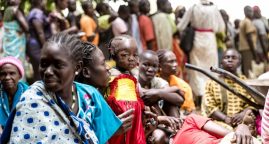Bakers, teachers, painters line up to volunteer to save lives in Syria
It looks like a sandstorm has blown in, the air thick with dust as a white van screeches to a halt and volunteers from Syria’s ‘White Helmets’ dash in to help dazed survivors after an airstrike in Aleppo.
In life before the war these volunteers of the Syrian Civil Defense, also known as the White Helmets, were ordinary citizens, from bakers to teachers to painters. They are now on the frontline of the conflict and the first in when the shells hit. “We used to be called to an attack once a month that had 30 martyrs, but during the Russian intervention we were called to many attacks, where the numbers of martyrs was more than 100 and the injured more than 200,” said Raed al Saleh, director of the White Helmets.
Saleh used to be an electrical supplies salesman before heading up the search and rescue operation of the group of unarmed men and women that was set up to fill the void of emergency responders no longer on hand when the bombs dropped. The non-sectarian group was officially formed in 2014 and now has 3,000 volunteers, describing itself as the largest civil society organization operating in areas outside of government control, and many more wish to join. “The strikes have targeted vital centers that provide help to people on a regular basis and then attacking the people that rush to help. Recently, 10 hospitals were destroyed,” Saleh said in an interview during a recent visit to London.
As the Syrian conflict enters its sixth year the team said they have also reached their own tragic milestone having rescued over 50,000 of their own countrymen. In London recently, Saleh delivered a speech at a Syria donor conference to world leaders and non-government organizations. But instead of calling for more money to fund his operation he appealed for a plan to stop the bombing, stressing no amount of money will save children from the dangers of barrel bombs which are the single biggest killer of civilians in Syria.
Read the full article on daily sabah website
Related Articles
Risk of Death from Starvation Grows in Africa
04/11/2017. The Lack of money is pushing the humanitarian crisis ever closer in Yemen, Nigeria, and South Sudan,
Malteser International | Syria’s War Children | No lost generation
06/20/2017. Syria’s War Children | No lost generation
A framework to underpin action to prevent violence against women
Violence against women is one of the most pervasive human rights violations in the world, rooted in gender inequality, discrimination and harmful cultural and social norms






